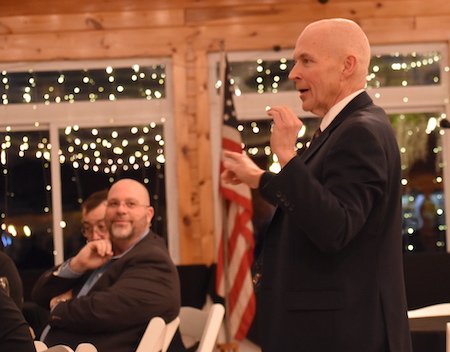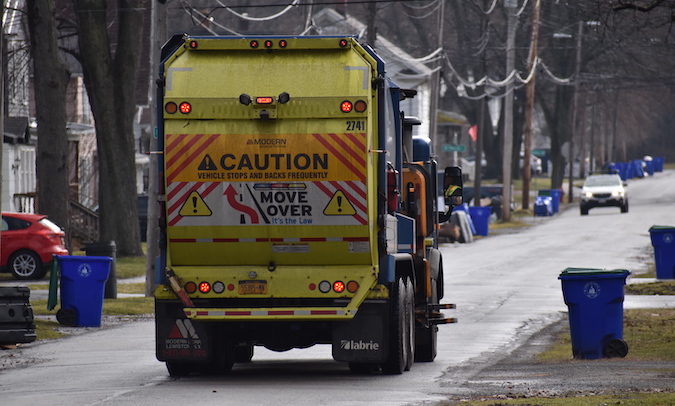County may implement 2-tiered garbage collection rates, with some on private roads paying more
LYNDONVILLE – Modern Disposal picks up garbage and recyclables for about 15,000 residential sites in Orleans County.
The company faces a challenge at about 10 percent of the sites, properties along some of narrow private roads. Modern can’t easily get its larger trucks down those roads, which tend to be in the lakeshore communities in Yates, Carlton and Kendall. There is also one in Barre on Rice Road.
Often there are branches projecting towards the road that can scratch and damage the $400,000 garbage trucks. Or the roads may be muddy and not have adequate turnarounds, Modern officials told local government leaders last week.
On garbage collection days for communities with the private lanes, the company will use two larger garbage trucks and three pickup trucks with a hopper and lift. But those pickup trucks only have space to collect garbage from about 12 to 15 of the sites. Then the driver of those trucks has to hunt down a larger garbage truck to transfer that trash, and then they go back to the private road for another fill. The big trucks can hold enough garbage from about 800 residential sites.

Jack Welch, the county’s chief administrative officer, speaks during last week’s Orleans County Association of Municipalities when town, village and county officials discussed the garbage collection challenges on the narrow lanes. Dennis Moriarty, seated, is the vice president of collection operations for Modern.
Using the satellite pickup trucks is not efficient. It requires more staff, more vehicles and much more time, Modern officials said.
“This has gone on for years,” said Dennis Moriarty, vice president of collection operations for Modern. “We’d like a resolution. We’d like to solve it.”
There could be collection points, perhaps with dumpsters in some of the areas with private roads. Residents would have to bring their garbage and recycling to those spots. It would be a lot more effort for them.
Not all private roads are too small for the trucks or lacking in a turnaround. Moriarty said some of the roads have the branches cut back. They are wide enough and there are spots for the trucks to turnaround. He said Kendall in particular has done a good job making the roads usable for the bigger trucks.
But many of the private lanes in Carlton and Yates are too difficult for the garbage trucks. Moriarty said sometimes the trucks go down the roads, and a second employee hops out of the truck to help the driver back up a half mile or more. That is not a safe situation for the Modern employees, having to back up a 40-foot-long truck for a long distance, Moriarty said.
Those trucks are also 13 feet wide and need a 30-foot-turning radius.
He wants to work with the towns to compile a breakdown of the current conditions, which of the private roads could be improved so the larger trucks could use them.
Modern is nearing the end of a five-year agreement for the garbage and recycling collection in the county. The contract expires the end of this year. Moriarty said the company wants to continue in Orleans, but wants the local officials, especially in the three lakeshore towns, to work with residents to improve the private roads.
Otherwise, there could be a two-tiered rate schedule, with the residents on some private roads paying more.
“I don’t really think it’s fair for everyone to subsidize a small portion of the population,” said Jack Welch, the county’s chief administrative officer.
Welch and Modern Disposal leaders discussed the challenge last week during a meeting of the Orleans County Association of Municipalities which includes officials from town, village and county officials. Welch said they wanted the issues out there well before the contract expired at the end of the year to give the community several months to work on the issues with some of the private roads. Welch estimated the issue on the private affects about 1,500 residential sites out of the 15,000 total in the county.
Tony Cammarata, the Kendall town supervisor, said the private roads residents won’t be happy if they are required to pay more than the rest of the county.
“If it’s a two-tiered system you watch the fireworks explode,” he said.
But Welch said it’s only fair if those properties require more trucks and more expense from Modern. Welch said Kendall has done the most to keep the private roads up to standard not only for garbage trucks, but for school buses and fire trucks.
Cammarata offered praise for the garbage collection program in the county, where the county administers the contract and residents are billed $216 annually as part of their county taxes. Cammarata said it’s great deal for the local residents and a program the county should brag about. In many other communities outside Orleans there are multiple trash haulers and residents are paying a much-higher price.
Looking into the not-too-distant future, Modern Disposal officials said the company is looking to automate more of the collection. They move to the larger 96-gallon tote for recycling totes in June 2019. They are picked up with an automated arm on the trucks and unloaded with an employee having to leave the truck.
Modern Disposal said the industry is shifting to those larger totes also for garbage collection. It is more efficient, and safer for employees. But it also requires adequate space on a road.
The company also has a couple garbage trucks that are all-electric. Moriarty said they have enough charge for about six hours of use. That is enough to serve some of Niagara County near the company’s landfill and base near Lewiston. But the Orleans trucks are run about 10 hours a day. Moriarty said the electric vehicles need to make advancements before there is a larger changeover to all-electric.
The company is transitioning to more green energy, he said. About 40 percent of the fleet is powered by compressed natural gas, instead of diesel. That has helped insulate the company from some of the price hikes with gas, Moriarty said.
Regarding the garbage collection on the private roads, Welch said there are six to eight months for those communities to discuss how to either improve their roads and possibility put in a turnaround, or consider spots for a dumpster for residents.
Moriarty said the company is committed to finding a solution for all of the residents.
“We want everybody’s trash to get picked up,” he said. “We want to make this as easy as possible.”










































































